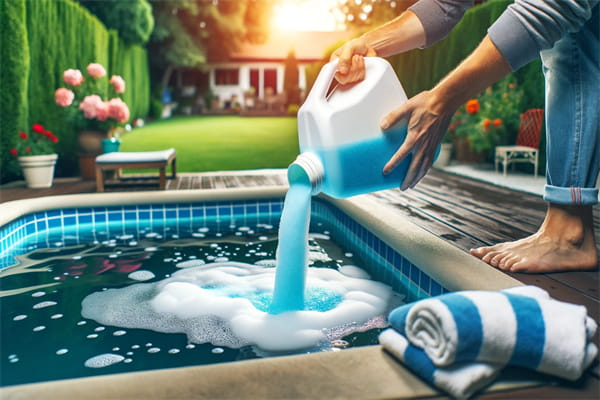Welcome to our in-depth exploration of swimming pool maintenance! Whether you are a seasoned pool owner or new to the game, keeping your pool water clear and inviting is essential. In this article, we will focus on two critical products used to maintain pristine pool conditions: pool flocculants and clarifiers. Understanding the difference between these treatments and when to use each can significantly enhance your pool care routine.

Ⅰ.What Are Pool Flocculants?
Pool flocculants play a pivotal role in keeping your swimming pool water crystal clear. These chemicals work by clumping together the tiny particles that cloud your water, making them large enough to either be filtered out or settle at the bottom of the pool for easy removal. Common types of pool flocculants include substances like polyaluminum chloride (PAC) or aluminum sulfate, which are highly effective in binding with microscopic debris.

Ⅱ.What Are Clarifiers?
On the other hand, clarifiers also help maintain clear pool water but operate differently. Pool clarifiers gather small particles that might pass through your pool filter and bind them into larger aggregates that can be more easily captured by the filtration system. They are particularly useful in scenarios where the water contains a lot of fine, suspended particles that are difficult to settle or filter out.

Ⅲ.The Key Differences Between Pool Flocculants and Clarifiers
1.Method of Action
a. Pool Flocculants:
Mechanism:
Pool flocculants function by aggregating fine particles into larger clumps. This aggregation occurs due to the chemical nature of flocculants which bind with the particles.
Outcome:
These larger particle clumps become heavy enough to settle at the bottom of the pool, forming a layer of sediment that can be physically removed by vacuuming.
b. Clarifiers:
Mechanism:
Clarifiers also aggregate particles, but they do so in a manner that enhances the ability of your pool’s filter to capture them. They increase the size of the particles just enough so they can be trapped by the filtration system.
Outcome:
Instead of settling to the bottom, the particles remain suspended in the water column but are more easily caught by the filter during the filtration process, thus gradually clearing the water without the need for manual removal.
2.Applications
a. Pool Flocculants:
Ideal for:
They are best used in situations where the pool water is significantly cloudy or has a high level of suspended particles. Pool flocculants are suitable for deep cleaning when quick and dramatic results are needed.
Usage Considerations:
Since flocculation typically precedes vacuuming, it requires manual effort to remove the settled particles. It is not a set-it-and-forget-it solution but rather an active cleaning process.
b. Clarifiers:
Ideal for:
They are more suitable for mild to moderate cloudiness and are used as part of regular pool maintenance. Clarifiers are perfect for ongoing treatment to enhance filter performance and prevent future cloudiness.
Usage Considerations:
Since clarifiers work by aiding the filter, they are less labor-intensive compared to flocculants. They do not usually require additional steps post-application, making them easier to handle on a routine basis.
3.Results
a. Pool Flocculants:
Immediate Impact:
The effect of pool flocculants is often visible within 24 to 48 hours, providing a fast solution to severe cloudiness. After treatment, the water clarity is significantly improved, but this comes at the cost of needing to physically remove the debris.
Maintenance After Use:
Post-application, you must vacuum the pool to remove the settled debris, which can be a time-consuming task.
b. Clarifiers:
Gradual Improvement:
Clarifiers do not offer instant clarity but work over several days to restore water transparency. They are less disruptive to the pool’s routine use.
Ongoing Benefits:
Regular use of clarifiers helps in maintaining the efficiency of the pool’s filtration system, thereby prolonging the intervals between major cleanings.
Ⅳ.Should I Use Pool Flocculants or Clarifiers?
- Choosing between pool flocculants and clarifiers depends largely on your specific pool conditions and what you need to achieve. If your pool water is extremely cloudy and you need a quick solution, pool flocculants are likely your best bet. They will gather all the debris at the bottom of your pool, which can then be vacuumed out, leaving your water sparkling clean.
- However, if you are dealing with a slightly cloudy pool and have a functioning filtration system, clarifiers might be more appropriate. They will enhance your filter’s ability to trap particles, keeping your pool clear without the need for intensive cleaning.
Ⅴ.Conclusion
In conclusion, both pool flocculants and clarifiers have their place in swimming pool maintenance. By understanding the differences between these products, you can better decide which is right for your pool. Pool flocculants offer a rapid, thorough cleaning by settling particles at the bottom, while clarifiers provide a less intensive, maintenance-oriented approach to clarity.Remember, it’s crucial to assess your pool’s condition and maintenance needs before choosing between pool flocculants and clarifiers. Each product serves a purpose, and choosing the right one can keep your pool water perfectly clear and healthy.

 Instant
Quote
Instant
Quote Email
Us
Email
Us